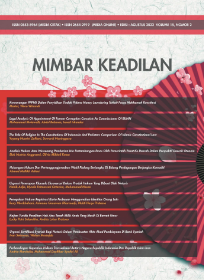The Role of Religion In The Constitutions of Indonesia and Pakistan: Comparison of Islamic Constitutional Law
DOI:
https://doi.org/10.30996/mk.v15i2.6521Keywords:
Comparison, Constitutions, Democracy, Indonesia, PakistanAbstract
The purpose of knowing the position of religion in the state constitution is to know how to protect human rights and what are the noble values that regulate the lives of citizens, therefore religion in the constitution is one of the benchmarks for the administration of the state, constitutional norms place religion to occupy the important in the life of the state so that another consequence of the implementation of religious values in the state is the policies of state officials and the behavior of citizens should not conflict with religious values. This study uses a normative approach and uses a qualitative analysis methodology with data collection techniques through literature studies such as legislation, books, legal journals, and online media. The results of the analysis show that in terms of the constitutions in Indonesia and Pakistan, there are several basic differences, starting from the use of norms, state institutions, government systems, social pluralism, and the implementation of the constitution considering that Indonesia is not an Islamic country while Pakistan is an Islamic country but there are still some similarities. between Indonesia and Pakistan, but this shows that if only religion is used in the constitution without paying attention to the social, economic, political, and cultural needs of the community, this will become a big problem so it will need to share
Downloads
Downloads
Published
Issue
Section
License
Authors who publish with Mimbar Keadilan agree to the following terms:
- Authors transfer the copyright and grant the journal right of first publication with the work simultaneously licensed under a Creative Commons Attribution-ShareAlike 4.0 International License.. that allows others to share the work with an acknowledgement of the work's authorship and initial publication in this journal.
- Authors are able to enter into separate, additional contractual arrangements for the non-exclusive distribution of the journal's published version of the work (e.g., post it to an institutional repository or publish it in a book), with an acknowledgement of its initial publication in this journal.
- Authors are permitted and encouraged to post their work online (e.g., in institutional repositories or on their website) prior to and during the submission process, as it can lead to productive exchanges, as well as earlier and greater citation of published work (See The Effect of Open Access)














